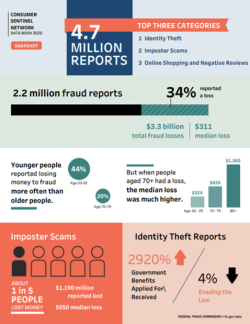
In the old TV show Dragnet, Sergeant Joe Friday was famous for saying “Just the facts, ma’am.” But like “Play it again, Sam” in Casablanca, that quotable quote was never actually said by the lead character. But when we tell you that the FTC’s just-released 2021 Consumer Sentinel Data Book gives you “just the facts,” be assured that’s what you’ll get. And one of those facts – the most commonly reported forms of fraud in 2021 – should be of particular interest to businesses.
What’s the source of the Data Book’s data? It’s the Consumer Sentinel Network – a database that receives reports directly from consumers, as well as from federal, state, and local law enforcement agencies, Better Business Bureaus, industry members, and non-profit groups. The FTC shares those reports with approximately 2800 federal, state, local, and international law enforcers, who in turn use that information to identify trends, craft policy, and build cases.
The 2021 Data Book is jam-packed with stats, but here are a few of the most noteworthy:
- Millions of Americans filed fraud reports last year. In 2021, people filed a total of 5.7 million reports. In addition to identity theft reports and complaints about businesses, 2.8 million of those reports were about fraud.
- Reported dollar losses took a sharp uptick. Consumers reported losing more than $5.8 billion to fraud in 2021, an increase in reported losses of more than 70% over 2020.
- Imposter scams still hold the unenviable top spot. The most commonly reported fraud category was imposter scams, followed by online shopping scams.
Why should businesses care about the one-two ranking of imposter scams and online shopping scams? First, imposter scams in their familiar forms – family emergency scams, romance scams, government imposter scams, etc. – devastate your employees, their family members, and people in your community. But they don’t stop there. As cases brought by the FTC demonstrate, scammers have small businesses in their sights, too. Whether it’s a phony invoice for unordered office supplies, a bogus offer of financing from someone masquerading as an SBA lender, or a fraudster hijacking your email account, businesses are a target for imposters, too. As small companies work hard to get back on their feet, a major fraud loss could be the difference between a come-back and a closing.
Second, consumers who have lost money to online shopping scams may view legitimate online companies with heightened suspicion. One group that takes an unfair financial hit: honest small businesses.
As you scroll through the 2021 Data Book, be sure to check out the FTC’s data analysis site, ftc.gov/exploredata, for all the ways our in-house info aces have sliced and diced the stats by state, metropolitan area, and other relevant variables. You can even create custom visuals for your next industry webinar or community event.
The publication of the annual Data Book is also a reminder for us to say thank you. Not to the scammers and fraudsters, of course, but rather to the millions of Americans who visit ReportFraud.ftc.gov to let us know if they’ve been ripped off or have spotted a questionable business practice. Your reports help law enforcement agencies gather the information they need to track down – and take down – scammers.
